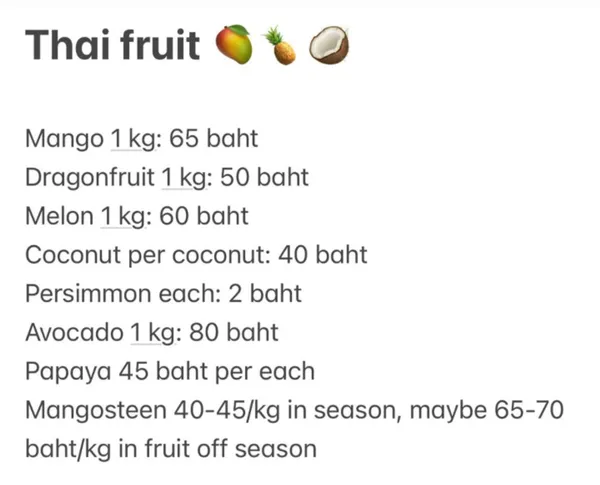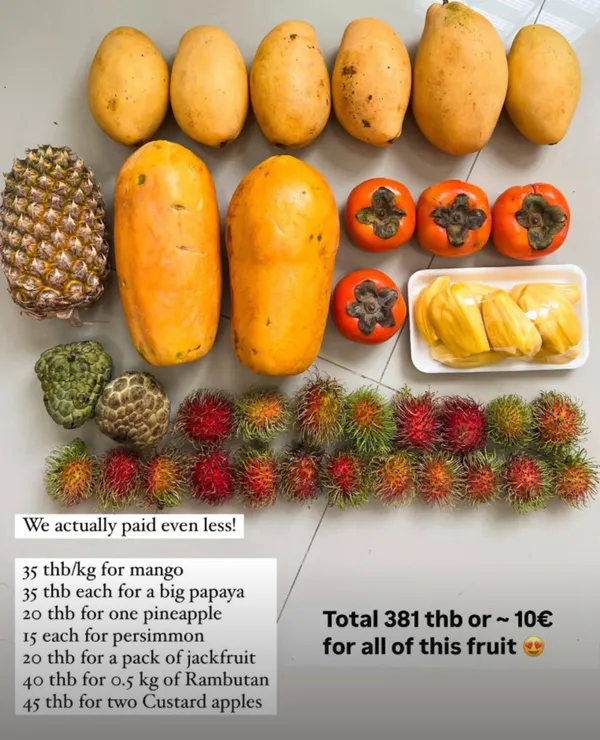How to shop like a local (and avoid overpaying)
My guide for how to shop, order and avoid getting overcharged in Thailand.
Before I share prices, I just want to come out and say to please, please PLEASE do not contribute to toxic overcharging tourism culture. You might think that you can "afford" to give more, but it's actually more harmful than it's good.
When tourists are willing to spend more money than locals, they can become the preferred clientele, and businesses might start to raise prices to represent what foreign tourists seem to be willing to pay. This leads to generalisation, gentrification, racism, dishonesty, greediness, scams, increased prices, dual pricing (because they have now seen that "tourists can pay more") and every tourist being viewed as a walking money bag.
And yes, it is a form of racism. Just because YOU can afford to pay more, it doesn't mean every tourist can. There can be tourist that travel on a very low budget and can't afford to deal with being ripped off left and right just because YOU can afford to pay 5€ for something that should cost 1€ (it adds up!). But they will still be viewed the same. So let's please be mindful of each other. 💛
Overpaying as a tourist hurts locals too. Even if you think paying them more money 'because you can afford to give them the extra coins and they need it more than you' is an act of kindness, overpaying will actually hurt the locals in the long run.
More businesses tailored to elevated tourist prices will open (because they've noticed tourists pay more than locals), which might raise prices overall and make it harder for locals to survive, ultimately pushing them out of their homes. These shops with elevated tourist prices are usually also of less quality and 'tourist-tailored', meaning the area might ultimately lose a lot of its authenticity and culture.
All because tourists were willing to pay more.
Local prices are based on what local people CAN AFFORD to pay. They wouldn't price something a certain price if it wouldn't be reasonable and enough for them to survive, live a good life and operate their business. They don't need more money because it's cheap for you.
Which leads me to my second point: PLEASE STOP THINKING IN YOUR HOME COUNTRY’S CURRENCY. You have to start thinking in the local country’s currency and THEIR average prices to get an understanding of what you’re paying. Please stop saying ”it’s only $4 for a meal that’s so cheap” because IT IS NOT. $4 for a meal in Thailand is a lot. That’s 140 baht. In local standards a meal should cost you half that or less.
Please don’t contribute to the toxic overcharging tourism culture by not learning what you should pay for things in the country you’re visiting (aka what locals pay - THAT is your guideline).
Find this out by asking locals what they would pay for ___ and ___ and use common sense. Whenever someone presents you with a price - ask yourself - would a local be able to afford this? If the answer is no, stay away.
It has nothing to do with how much YOU personally can afford, but everything to do with contributing to honest interaction between humans. The more you let people scam you out of money, the more you will contribute to a toxic, greedy tourism culture where locals might see tourists as nothing but walking money bags, locals being hurt by increased prices, scams growing and humans operating from a point of hate and greed rather than love and honesty. Is that really the kind of world you want to live in? Please be a responsible tourist and don’t overpay (or overtip).
Overtipping is just as bad, because again, it demonstrates that "tourists can afford to pay more than the given price", again contributing to increased prices, overcharging and all of the above. Research the tipping culture in the country you're visiting and don't take your home country's customs with you.
For example, in Thailand tipping is not expected. So simply don't tip unless someone has done an exceptional job and you genuinely want to show your appreciation and kindness in the form of a tip. Then it's okay. Anything from a 20-50 baht tip might be reasonable for anything costing over 100-150 baht.
I know this was a big intro, but it's really so important. So please take a second to read it and try to understand. I am not trying to blame anyone, in fact I love and respect all of you. I wish for the world to be a kinder, more united and more loving place, and this is one way we that can actively contribute to that.
Being a responsible traveller means paying local prices.
A great example of toxic tourism culture is how I've heard other tourists complain about how "Thais just try to scam you out of money and rip you off" (presumably written based on an experience from somewhere like Phuket or Koh Samui), but travelling in local areas we were met by nothing but pure honesty and kindness. Thais often refused tips if we tried to give them for exceptional service (again, not something we do a lot, but sometimes), always told us the honest local price for food and goods (if the prices were not already displayed, as they often are), and gave us the remaining money back if we accidentally paid too much.
Tourists complain about toxic tourism culture too, so don't contribute to it happening. Remember, not everyone can afford what you can afford to pay.
With that said, LET'S DIG INTO PRICES:
We asked a local smoothie-seller in Bangkok what is fair to pay for fruit and she told us this:

Persimmon 20 baht* (not 2)
However, we often found fruit for even less:

Generally we found:
mango to be priced between 30-50 baht/kg
papaya 20-50 baht per papaya depending on size
bananas for 10-40 baht depending on the size of the bunch
Seasons may affect fruit prices.
I'm sharing this because in tourist areas, especially in Bangkok, I sometimes saw mango being sold for anything from 50 baht PER mango to 220 baht/kg for mango, which is insanely expensive. So don't overpay for fruit - now you know what it should cost!
OTHER REASONABLE FOOD PRICES:
A standard meal should cost anything between 35-80 baht to be reasonably priced.
In vegetarian jay restaurants meals usually cost between 35-50 baht.
Fruit shakes (smoothies): 30-50 baht
Mango sticky rice: 40-60 baht
Food stall snacks such as lychee juice, sugarcane juice, fried bananas and sweet potato balls usually cost 20-30 baht for one cup/one batch.
REASONABLE DRINK PRICES:
A local beer like Chang or Leo (better): 35 baht
Drinks like Coca Cola: 20-25 baht for a can
Coffee: 40-70 baht (ice coffee is usually around 5 baht more expensive)
ACCOMMODATION:
This will obviously depend on your budget, but a general tip I can give is to book accommodation through Agoda, not Booking.com in Southeast Asia as Agoda generally has (much) cheaper prices for the same listings! We usually spent between 10-18€/night for a normal, decent hotel room with everything you need.
TRANSPORT:
So this obviously depends completely on where and how far you go, so I sadly can't give any standard prices here. All I can say is that any transport that costs over 500 baht unless it's a very long journey should definitely be questioned. Any short journey within a city shouldn't cost more than 50-100 baht (and often less).
Example transport prices we paid:
90 baht/pp for a 2 hour train journey between Bangkok - Ratchaburi (class 2)
40 baht/pp for a 3.5 hours train journey from Pranburi - Chumphon (class 3)
550 baht/pp for minivan transport (pickup from hotel) + ferry to Koh Phangan from Chumphon (tourist prices might have been at play here)
80 baht/pp one way for the ferry to Koh Chang
Moped rental: normally 200-300 baht per day
So yeah, transport shouldn't cost much. Use common sense, think in LOCAL STANDARDS (not your home country's currency) and don't overpay for transport (tuktuk drivers and taxi drivers especially might try to get you to do this).
THAI MASSAGE:
200-300 baht for 1 hour
(yes, this deserved its own section! :))
Stai cercando qualcosa da fare?
Vai a consultare la mia guida per le migliori cose gratuite da fare, nonché itinerari e consigli di viaggio per rendere il tuo viaggio indimenticabile.

